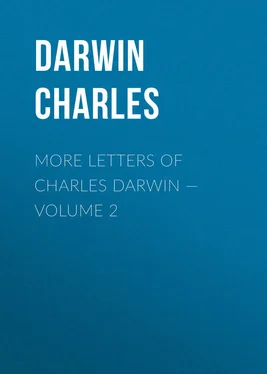Charles Darwin - More Letters of Charles Darwin — Volume 2
Здесь есть возможность читать онлайн «Charles Darwin - More Letters of Charles Darwin — Volume 2» — ознакомительный отрывок электронной книги совершенно бесплатно, а после прочтения отрывка купить полную версию. В некоторых случаях можно слушать аудио, скачать через торрент в формате fb2 и присутствует краткое содержание. Жанр: foreign_antique, foreign_prose, на английском языке. Описание произведения, (предисловие) а так же отзывы посетителей доступны на портале библиотеки ЛибКат.
- Название:More Letters of Charles Darwin — Volume 2
- Автор:
- Жанр:
- Год:неизвестен
- ISBN:нет данных
- Рейтинг книги:5 / 5. Голосов: 1
-
Избранное:Добавить в избранное
- Отзывы:
-
Ваша оценка:
- 100
- 1
- 2
- 3
- 4
- 5
More Letters of Charles Darwin — Volume 2: краткое содержание, описание и аннотация
Предлагаем к чтению аннотацию, описание, краткое содержание или предисловие (зависит от того, что написал сам автор книги «More Letters of Charles Darwin — Volume 2»). Если вы не нашли необходимую информацию о книге — напишите в комментариях, мы постараемся отыскать её.
More Letters of Charles Darwin — Volume 2 — читать онлайн ознакомительный отрывок
Ниже представлен текст книги, разбитый по страницам. Система сохранения места последней прочитанной страницы, позволяет с удобством читать онлайн бесплатно книгу «More Letters of Charles Darwin — Volume 2», без необходимости каждый раз заново искать на чём Вы остановились. Поставьте закладку, и сможете в любой момент перейти на страницу, на которой закончили чтение.
Интервал:
Закладка:
I have not Baer's papers; but, as far as I remember, the subject is not fully discussed by him.
I quite agree about Wallace's position on the ocean and continent question.
To return to geographical distribution: As far as I know, no one ever discussed the meaning of the relation between representative species before I did, and, as I suppose, Wallace did in his paper before the Linnean Society. Von Buch's is the nearest approach to such discussion known to me.
LETTER 400. TO W.D. CRICK.
(400/1. The following letters are interesting not only for their own sake, but because they tell the history of the last of Mr. Darwin's publications — his letter to "Nature" on the "Dispersal of Freshwater Bivalves," April 6th, 1882.)
Down, February 21st, 1882.
Your fact is an interesting one, and I am very much obliged to you for communicating it to me. You speak a little doubtfully about the name of the shell, and it would be indispensable to have this ascertained with certainty. Do you know any good conchologist in Northampton who could name it? If so I should be obliged if you would inform me of the result.
Also the length and breadth of the shell, and how much of leg (which leg?) of the Dytiscus {a large water-beetle} has been caught. If you cannot get the shell named I could take it to the British Museum when I next go to London; but this probably will not occur for about six weeks, and you may object to lend the specimen for so long a time.
I am inclined to think that the case would be worth communicating to "Nature."
P.S. — I suppose that the animal in the shell must have been alive when the Dytiscus was captured, otherwise the adductor muscle of the shell would have relaxed and the shell dropped off.
LETTER 401. TO W.D. CRICK. Down, February 25th, 1882.
I am much obliged for your clear and distinct answers to my questions. I am sorry to trouble you, but there is one point which I do not fully understand. Did the shell remain attached to the beetle's leg from the 18th to the 23rd, and was the beetle kept during this time in the air?
Do I understand rightly that after the shell had dropped off, both being in water, that the beetle's antenna was again temporarily caught by the shell?
I presume that I may keep the specimen till I go to London, which will be about the middle of next month.
I have placed the shell in fresh-water, to see if the valve will open, and whether it is still alive, for this seems to me a very interesting point. As the wretched beetle was still feebly alive, I have put it in a bottle with chopped laurel leaves, that it may die an easy and quicker death. I hope that I shall meet with your approval in doing so.
One of my sons tells me that on the coast of N. Wales the bare fishing hooks often bring up young mussels which have seized hold of the points; but I must make further enquiries on this head.
LETTER 402. TO W.D. CRICK. Down, March 23rd, 1882.
I have had a most unfortunate and extraordinary accident with your shell. I sent it by post in a strong box to Mr. Gwyn Jeffreys to be named, and heard two days afterwards that he had started for Italy. I then wrote to the servant in charge of his house to open the parcel (within which was a cover stamped and directed to myself) and return it to me. This servant, I suppose, opened the box and dropped the glass tube on a stone floor, and perhaps put his foot on it, for the tube and shell were broken into quite small fragments. These were returned to me with no explanation, the box being quite uninjured. I suppose you would not care for the fragments to be returned or the Dytiscus; but if you wish for them they shall be returned. I am very sorry, but it has not been my fault.
It seems to me almost useless to send the fragments of the shell to the British Museum to be named, more especially as the umbo has been lost. It is many years since I have looked at a fresh-water shell, but I should have said that the shell was Cyclas cornea. (402/1. It was Cyclas cornea.) Is Sphaenium corneum a synonym of Cyclas? Perhaps you could tell by looking to Mr. G. Jeffreys' book. If so, may we venture to call it so, or shall I put an (?) to the name?
As soon as I hear from you I will send my letter to "Nature." Do you take in "Nature," or shall I send you a copy?
CHAPTER 2.VIII. — MAN
I. Descent of Man. — II. Sexual Selection. — III. Expression of the Emotions.
2. VIII.I. DESCENT OF MAN, 1860-1882.
LETTER 403. TO C. LYELL. Down, April 27th {1860}.
I cannot explain why, but to me it would be an infinite satisfaction to believe that mankind will progress to such a pitch that we should {look} back at {ourselves} as mere Barbarians. I have received proof-sheets (with a wonderfully nice letter) of very hostile review by Andrew Murray, read before the Royal Society of Edinburgh. (403/1. "On Mr. Darwin's Theory of the Origin of Species," by Andrew Murray. "Proc. Roy. Soc., Edinb." Volume IV., pages 274-91, 1862. The review concludes with the following sentence: "I have come to be of opinion that Mr. Darwin's theory is unsound, and that I am to be spared any collision between my inclination and my convictions" (referring to the writer's belief in Design).) But I am tired with answering it. Indeed I have done nothing the whole day but answer letters.
LETTER 404. TO L. HORNER.
(404/1. The following letter occurs in the "Memoir of Leonard Horner, edited by his daughter Katherine M. Lyell," Volume II., page 300 (privately printed, 1890).)
Down, March 20th {1861}.
I am very much obliged for your Address (404/2. Mr. Horner's Anniversary Address to the Geological Society ("Proc. Geol. Soc." XVII., 1861).) which has interested me much...I thought that I had read up pretty well on the antiquity of man; but you bring all the facts so well together in a condensed focus, that the case seems much clearer to me. How curious about the Bible! (404/3. At page lxviii. Mr. Horner points out that the "chronology, given in the margin of our Bibles," i.e., the statement that the world was created 4004 B.C., is the work of Archbishop Usher, and is in no way binding on those who believe in the inspiration of Scripture. Mr. Horner goes on (page lxx): "The retention of the marginal note in question is by no means a matter of indifference; it is untrue, and therefore it is mischievous." It is interesting that Archbishop Sumner and Dr. Dawes, Dean of Hereford, wrote with approbation of Mr. Horner's views on Man. The Archbishop says: "I have always considered the first verse of Genesis as indicating, rather than denying, a PREADAMITE world" ("Memoir of Leonard Horner, II.", page 303).) I declare I had fancied that the date was somehow in the Bible. You are coming out in a new light as a Biblical critic. I must thank you for some remarks on the "Origin of Species" (404/4. Mr. Horner (page xxxix) begins by disclaiming the qualifications of a competent critic, and confines himself to general remarks on the philosophic candour and freedom from dogmatism of the "Origin": he does, however, give an opinion on the geological chapters IX. and X. As a general criticism he quotes Mr. Huxley's article in the "Westminster Review," which may now be read in "Collected Essays," II., page 22.) (though I suppose it is almost as incorrect to do so as to thank a judge for a favourable verdict): what you have said has pleased me extremely. I am the more pleased, as I would rather have been well attacked than have been handled in the namby-pamby, old-woman style of the cautious Oxford Professor. (404/5. This no doubt refers to Professor Phillips' "Life on the Earth," 1860, a book founded on the author's "Rede Lecture," given before the University of Cambridge. Reference to this work will be found in "Life and Letters," II., pages 309, 358, 373.)
LETTER 405. TO J.D. HOOKER.
Читать дальшеИнтервал:
Закладка:
Похожие книги на «More Letters of Charles Darwin — Volume 2»
Представляем Вашему вниманию похожие книги на «More Letters of Charles Darwin — Volume 2» списком для выбора. Мы отобрали схожую по названию и смыслу литературу в надежде предоставить читателям больше вариантов отыскать новые, интересные, ещё непрочитанные произведения.
Обсуждение, отзывы о книге «More Letters of Charles Darwin — Volume 2» и просто собственные мнения читателей. Оставьте ваши комментарии, напишите, что Вы думаете о произведении, его смысле или главных героях. Укажите что конкретно понравилось, а что нет, и почему Вы так считаете.












